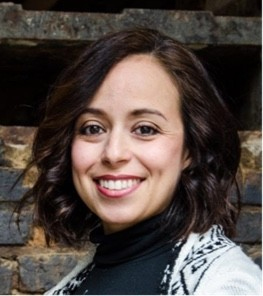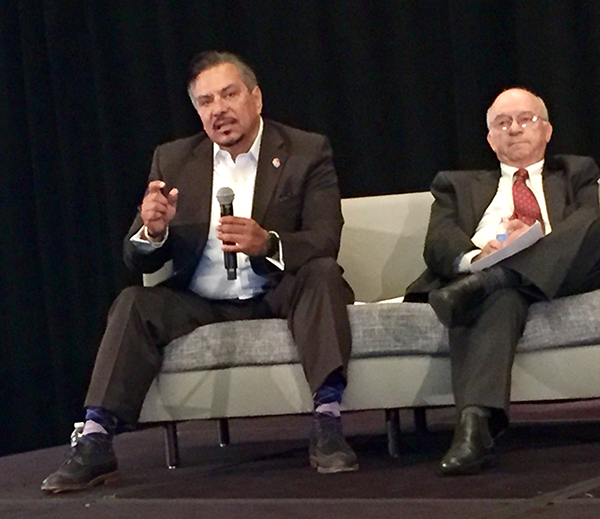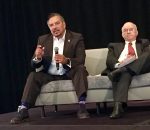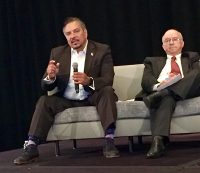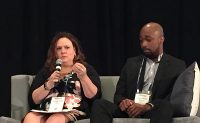On behalf of the Women In Food Safety Group, it was a pleasure to have the opportunity to interview Garry Hellmich, food safety and quality director at General Mills, and learn about his career path and leadership in food safety. During our discussion, Garry shared his perspective on how to continuously support and pursue women’s development, and offered advice to young female professionals who are interested in pursuing and/or expanding on a food safety career journey. Garry holds a food science degree from Purdue University and has dedicated his career to taking a preventive, risk-based mitigation approach to food through the supply chain and maintaining holistic quality management during the product lifecycle. His vast expertise lies in the food manufacturing sector where he started his career at Kroger and the Quaker Oats Company. From there, Garry built his experience through professional learning and getting promoted at Pillsbury and General Mills. His current responsibilities involve leading a large and high-performing global team of food safety subject matter experts at General Mills. He also shared some of his personal hobbies, which to no surprise includes cooking and baking—one of his signature personal favorites is chocolate truffles.
Garry believes in the power of continuously assessing yourself to identify and understand what your career motivators are in order to support career development. “Build your professional career, own your career and plan ahead,” he advises. Also, actively seeking career sponsors and mentors, and ensuring a dynamic team by building gender equality and diversity is key. “Food safety is not a competitive advantage—only the speed with which proactive risk mitigation is achieved is competitive,” says Hellmich.
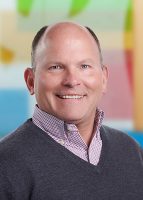
Gutierrez Becerra: Tell us about how your career began and led you to where you are today.
Garry Hellmich: I am a food scientist; I received a food science degree from Purdue University. I have more that 35+ years of progressive quality and food safety responsibility in the food industry, including experience in RTE cereals, hot cereals, dry mixes, convenience & food service and dry meals. I started my professional career at Kroger and The Quaker Oats Company, and then in 1991, I joined General Mills (including Pillsbury) where I continued leading in food safety and quality. My first job functions in the food industry were as a laboratory technician responsible for conducting routine micro testing and quality production, as a supervisor responsible for managing the quality of incoming raw material for production release and vendor relationships.
Gutierrez Becerra: What persuaded and motivated you to focus your career on food safety?
Hellmich: I spent three years in college while pursuing a major in pharmacy. After realizing it was not the right thing for me, I decided to take a year off. During the break, while trying to figure out what to do and having lunch with my grandma, she triggered the question: Why don’t you do something involving food—you love food. Then, while conversing with other family members who worked in the food industry, I became inspired and motivated to get a food science degree. I returned to Purdue to continue school with a major in food science. I started my career at different companies, learning about the importance of food safety and implementing [those principles] right away. Pillsbury developed HACCP for NASA, so risk analysis and overall HACCP development have been key throughout my career in both quality and food safety. I enjoy working for the food industry and the fact that I can work to solve many different types of problems. For example, going back to early times in my career, we faced a product recall due to a physical hazard; we assessed the problem and emphasized the importance of hazard analysis and control measures. In addition to working through a recall and leading specific actions to manage it, I gained experience on how to ensure the demand of all impacted retail and foodservice customers is met. And also, I was inspired and motivated by the strong food industry collaboration on a prompted technical and safety solution.
Gutierrez Becerra: What has being a leader in food safety brought you at both a professional and personal level?
Hellmich: There is huge pride when seeing products on the shelf based on a project you have worked on, and this has had a personal impact as well. In working with professionals in food development—they love to see their products on the shelf and so do I; I am proud of the work they have done. [In this business], there is always an interesting problem that needs to be solved, and we gain experience from working on these challenging issues, and it helps us grow. For example, in the 90’s an allergen incident directed me to lead an effort to develop an enhanced allergen protection program at the manufacturing level, which achieved our goal to reduce consumer allergen risk going forward.
Gutierrez Becerra: What have you learned from partnering and working with women throughout your career journey?
Hellmich: I have had the opportunity to work with a lot of talented and qualified women. About 20 years ago, I was interviewing candidates for a job opening. After presenting my candidate selection (a male candidate), my manager (a female leader) challenged me with the question: Why you didn’t choose the other female candidate who was equivalent when it came to experience and would balance the team from a gender standpoint? Later in my career, I kept gender balance in my mind. You can instantly recognize that the dynamic changes when female leaders join a team. Gender diversity is important for success. Forty years ago, General Mills was a male-dominated company. Then, with an idea of making changes, the company decided to hire many female food scientists with PhDs. Today, we have almost a 50-50 gender balance within the company.
Gutierrez Becerra: What would be your number one piece of advice to young women, students and professionals who are planning to become leaders in food safety?
Hellmich: I think it is very important to identify your career motivators, whether it is [tackling] challenges, having work-life balance, job security or advancement. The first step is to assess and know yourself, and what is important for you to pursue in your career. For me, it has been security and to create value. I have stayed in food safety and quality for my entire career, despite having the opportunity to move into other areas. I have always been honest with myself on what motivates my career and what I want to achieve.
I’d like to share a story with you: One of my first female team members was about to turn down an offer for a manager position that involved moving to a different location. The reason was that there was no childcare available at the new location. I advised her to discuss her career motivators with her husband. Ultimately she ended up taking the position with the support of her husband, who stayed home as they settled down in a new city. It is important to think beyond yourself, because your family can help you.
We are owners of our own career timeline, and realizing your own expectations is important—they are different for everyone based on family and personal factors. And lastly, always invest in creating value, which will help you move up within an organization. Look ahead and make your plan. When starting a career, make sure it’s your own.
My advice for a new college graduate is that in the real world, it’s all about application. Learn as much as you can in your current role and make an investment in yourself. Be available to support your team in any capacity that will help you learn and gain experience. Always learn something new and be ready when the next opportunity comes to you.
Gutierrez Becerra: What do you hope to see in the next three to five years in terms of the development and mentoring of women in the industry?
Hellmich: A good mentor of mine once told me that ultimately, one key way to move up is to make your boss look good and to always be prepared to take on any of your manager’s and/or any other employee’s responsibilities when needed. Being always prepared is the highest investment you can make; focus on continuously learning a new leadership and technical skill at any position level. It’s very important to know the difference between choosing career sponsors and mentors. A mentor is assigned, and sponsor is created. A mentor advises you, while sponsors advocate for you and provide opportunities. People tend to become sponsors when they see that you create value to the team and the organization. Hence, the more value you continuously create to the organization, the further you will go.
In closing, I’d like to point out four key areas to keep in mind throughout your career: 1. Assess and know yourself; 2.Understand your career motivators; 3. Build a network of mentors for all areas of growth you are interested in; and 4. Create trust with your line of sponsors so you can truly grow yourself and earn your own career path in the long run.

